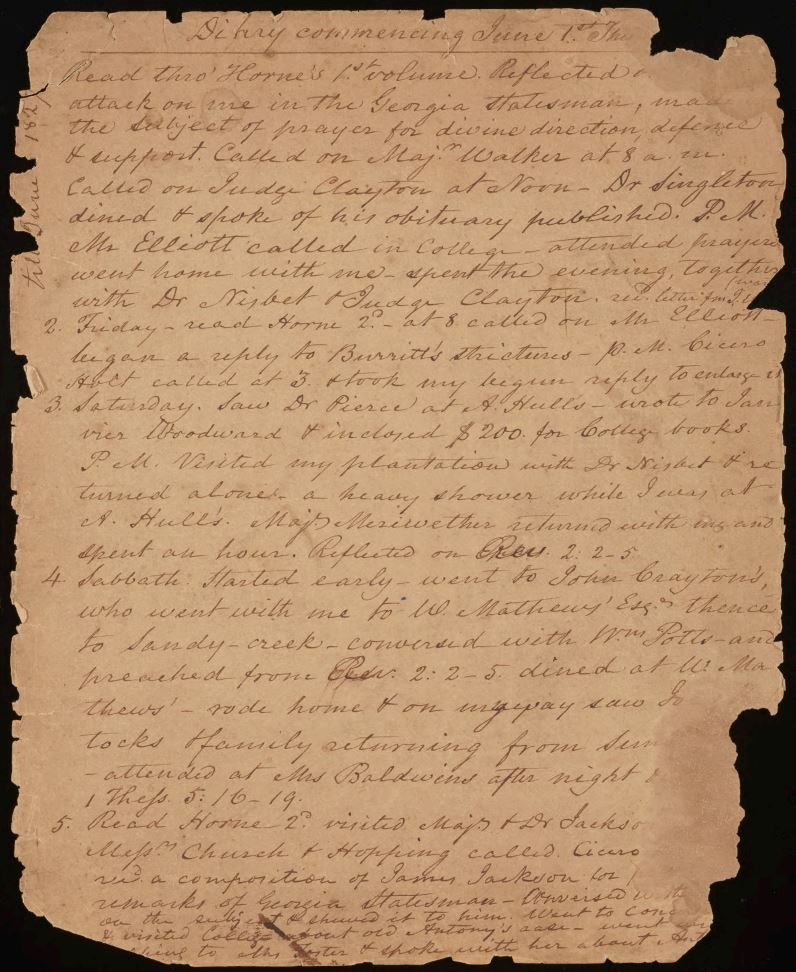ATHENS, Ga. — Three new collections featuring historical resources related to the Presbyterian Church, Presbyterian educators, and their role in Georgia history are now available through the Digital Library of Georgia.
Housed at Columbia Theological Seminary, the resources are freely available online thanks, in part, to the DLG’s competitive digitization grant program, a funding opportunity intended to broaden DLG partner participation in statewide historic digitization projects.
The three digital collections are:
- Joseph R. Wilson papers, from the late 1800s, including the sermons of Presbyterian minister and educator Joseph Ruggles Wilson dating 1858 to 1893. View at dlg.usg.edu/collection/gcl_wilson.
Wilson served as pastor of First Presbyterian Church in Augusta, Ga., and at First Presbyterian Church in Wilmington, N.C. He also taught at Columbia Theological Seminary and Southwestern Presbyterian University and was the father of President Woodrow Wilson.
- John Newton Waddel papers, 1821‐1881, including manuscripts and print material belonging to John Newton Waddel (1812-1895) and Moses Waddel (1770-1840). The father and son were Presbyterian ministers and educators in Georgia and Mississippi. View at dlg.usg.edu/collection/gcl_waddel.
Moses Waddel served as the fifth president of the University of Georgia. John Newton Waddel served as president of Presbyterian Synodical College in LaGrange, Tenn., and as chancellor of the University of Mississippi.
- Presbyterian Church in the U.S. Presbytery of Hopewell minutes, 1797‐1866, the official minutes of the Presbytery of Hopewell, the first Presbytery in the state of Georgia. View at dlg.usg.edu/collection/gcl_hopewell.
The Hopewell minutes provide descriptions of early missionary efforts among Native Americans, deliberations about slavery, and other collective decisions that offer perspectives from the state of Georgia between the Revolutionary War through the Civil War. Special thanks to the Northeast Georgia Presbytery for permitting the digitization of these records.
Erskine Clarke, professor emeritus of U.S. religious history at Columbia Theological Seminary, describes the research significance of these three collections:
“The Wilson sermons will have interest for anyone wishing to probe the religious life of Woodrow Wilson. In addition, they will provide insight into the theological assumptions and rhetorical and homiletical strategies of an influential nineteenth-century Georgia pastor.
“Presbytery minutes are rich resources for cultural and religious history, and the years of the Hopewell minutes (1797-1866) will be of great interest to historians working in that period of Georgia history.
“The links with the University of Georgia presidents are astonishing. The Waddel papers are even more exciting…To have these important documents available online will be a great gift to those who in the future explore the history of Georgia.”
About Columbia Theological Seminary
Columbia Theological Seminary exists to educate and nurture faithful, imaginative, and effective leaders for the sake of the church and the world. It is an educational institution of the Presbyterian Church (U.S.A.) and a community of theological inquiry, leadership development, and formation for ministry in the service of the church of Jesus Christ. Visit ctsnet.edu.



![Letters: Woodrow family, 1853-1857. Columbia Theological Seminary Collection, James Woodrow papers, 1808, 1836-1916 [bulk 1850-1867].](http://blog.dlg.galileo.usg.edu/wp-content/uploads/2015/06/James-Woodrow-letter-241x300.jpg)